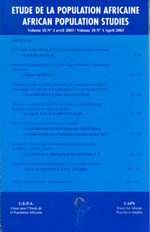
|
African Population Studies
Union for African Population Studies
ISSN: 0850-5780
Vol. 28, No. 2s, 2014, pp. 1072-1087
|
 Bioline Code: ep14051
Bioline Code: ep14051
Full paper language: English
Document type: Research Article
Document available free of charge
|
|
|
African Population Studies, Vol. 28, No. 2s, 2014, pp. 1072-1087
| en |
Political-economic Transitions and the Changing Context of Maternal Health Access in Tanzania: Evidence from DHS Data
Herman, Moshi Optat
Abstract
This paper highlights how the effect of household socioeconomic status on utilization of maternal health services changes over time concomitant with transformations of the social context, such as political economic transitions in the case of Tanzania. Using pooled data from four rounds of Demographic and Health Surveys (DHS) from Tanzania, this paper applies multilevel logistic regressions to examine how the effect of household wealth on utilization of medically-assisted birth delivery services (controlling for individual attributes) is mediated by place characteristics (regional wealth and urban/rural residence) and period (liberalization era 1990s vs. Millennium Development Goals era 2000s). With implications on health inequality in transition economies, the analysis finds statistically significant interaction effects between household wealth and place characteristics. The analysis also finds interaction effects between household wealth and period.
Keywords
maternal health; health inequality; birth delivery by skilled-staff; Tanzania; Demographic and Health Surveys (DHS)
|
| |
| fr |
Herman, Moshi Optat
Résumé
Ce document démontre comment l’effet des ménages sur l’utilisation de la santé maternelle change avec les
transformations sociales (transitions politiques et économiques) en Tanzanie. Les données d’Enquêtes
Démographiques de Santé (EDS) et des régressions logistiques multiniveaux indiquent comment la richesse
des ménages sur l'utilisation des services d’accouchement (contrôle des attributs individuels) est médiée par
les caractéristiques de l’emplacement (région et résidence urbaine/rurale) et la période (libéralisation en
1990 contre Objectifs de Développement du Millénaire en 2000). Avec des implications sur les inégalités de
santé dans les économies en transition, l'analyse conclut à des effets d'interaction significatifs entre richesse
des ménages et caractéristiques d’emplacement. L'analyse trouve également une interaction entre richesse
des ménages et période.
Mots Clés
maternal health; health inequality; birth delivery by skilled-staff; Tanzania; Demographic and Health Surveys (DHS)
|
| |
© Copyright 2014 - African Population Studies
Alternative site location: http://www.uaps-uepa.org
|
|
